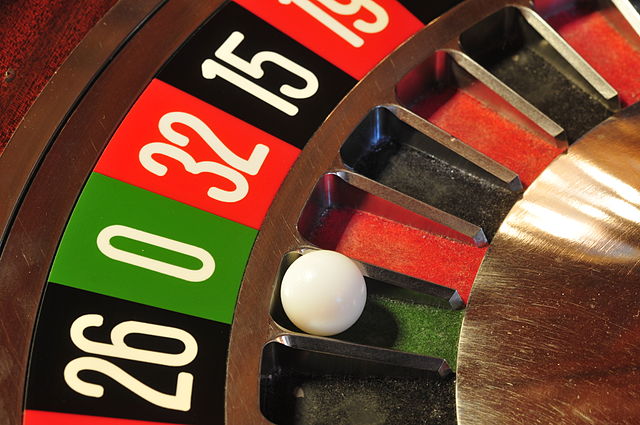Top Qs
Timeline
Chat
Perspective
Game of chance
Game whose outcome is determined by random events From Wikipedia, the free encyclopedia
Remove ads
A game of chance is in contrast with a game of skill. It is a game whose outcome is strongly influenced by some randomizing device. Common devices used include dice, spinning tops, playing cards, roulette wheels, numbered balls, or in the case of digital games random number generators. A game of chance may be played as gambling if players wager money or anything of monetary value.

Alternatively, a game of skill is one in which the outcome is determined mainly by mental or physical skill, rather than chance.[1] [2]
While a game of chance may have some skill element to it, chance generally plays a greater role in determining its outcome. A game of skill may also may have elements of chance, but skill plays a greater role in determining its outcome.
Gambling is known in nearly all human societies, even though many have passed laws restricting it. Early people used the knucklebones of sheep as dice. Some people develop a psychological addiction to gambling and will risk food and shelter to continue.
Remove ads
Skill
Some games that involve an element of luck may also require a certain level of skill. This is particularly evident when players need to make decisions based on prior knowledge or incomplete information, as seen in games like blackjack. In contrast, games such as roulette and punto banco (baccarat) rely more on chance, with players having the choice to determine their bet amount and selection, leaving the outcome largely to luck. Consequently, these games are categorized as games of chance, although a minimal skill component is still involved.[3]
The distinction between 'chance' and 'skill' is relevant because in some countries, chance games are illegal or at least regulated, but skill games are not.[4][5] Since there is no standardized definition, poker, for example, has been ruled a game of chance in Germany and, by at least one New York state Federal judge, a game of skill.[6]
Remove ads
Addiction
People who engage in games of chance and gambling can develop a strong dependence on them.[7] This is called psychopathology (addiction) of "pathological gambling". According to psychoanalyst Edmund Bergler, there are six characteristics of pathological gamblers:[8][9]
- They must play regularly: the issue here is to know when the subject performs "too much".
- The game takes precedence over all other interests.
- There is optimism in the player that is not initiated by repeated experiences of failure.
- The player never stops until they win.
- Despite the precautions that they originally promised, they end up taking too many risks.
- There is in them a subjective experience of "thrill" (a shivering sensation, excitement, tension, both painful and pleasant) during the phases of play.
Remove ads
State revenues
Governments that authorize games of chance generate significant gambling revenues.[10][11][12]
According to the UK Gambling Commission, the government received a total gross gambling revenue of £14.4 billion ($19 billion) in 2018.[13][14] That was up 45% from a year earlier.
The Gambling Commission is an executive non-departmental body of the UK government.[15] It is responsible for regulating gambling in the UK.[16] It also oversees gambling legislation.
The state government of Nevada, USA, received gambling revenues totaling $262 billion in 2017.[17] Casino contributions totaled $8522 million, 77% of the total, according to iGaming Business.[18]
Types
There are dozens of different types of games of chance. The most popular online casino games are video poker, roulette, craps, blackjack and sports betting. Baccarat is also popular.
- Casinos - they exist online as well as in physical buildings that people go into (in real life).
- Arcades - which may be intended exclusively for persons over the age of 18 or families.
- Bingo - which can be held in a bingo hall or online.
- Betting - which can be conducted online, in betting shops (sweepstakes) or at the event.
- Slot machines - such as fruit machines or fixed odds betting terminals.
- Video lottery terminals (VLTs) - machines that are connected to a central system that controls game outcomes.
- Pachinko - a Japanese game that mediates between a pinball machine and a slot machine.
Remove ads
See also
References
Wikiwand - on
Seamless Wikipedia browsing. On steroids.
Remove ads
